Batman: The Enemy Within – The Telltale Series Season 2 is a third-person episodic story driven point and click action adventure available from retail stores and for download from the PlayStation Store for the PS4. Telltale Games have gradually become more popular with every game having developed the cult classic Sam and Max seasons to episodic games based upon such well known licensed properties as Jurassic Park, Back to the Future, The Walking Dead, The Wolf Among Us, Tales from the Borderlands, Minecraft: Story Mode, Game of Thrones, Batman and more besides with Telltale’s star rising upon every release which has led to a certainly bright future ahead. Batman: The Enemy Within – The Telltale Series Season 2 is surely just as much of a challenge for Telltale Games as they have to follow-up an excellent season of storytelling from the first season that equals or improves upon their previous effort. How does Telltale’s story, dialogue and portrayal of Batman, Bruce Wayne and surrounding characters compare to Telltale’s prequel season?
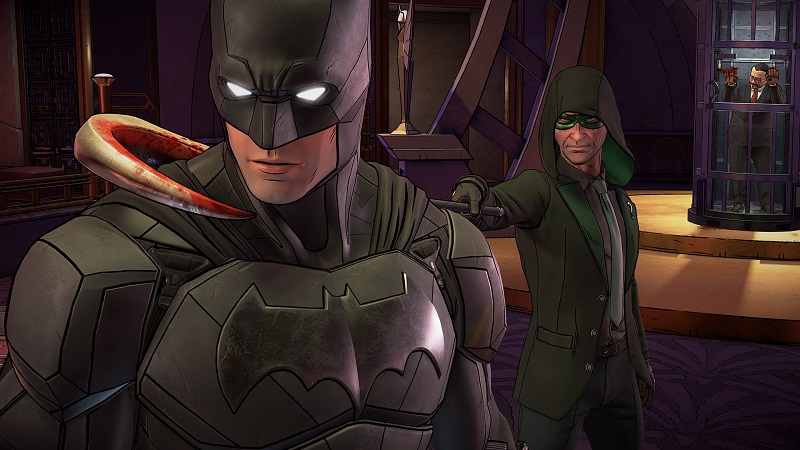
Batman: The Enemy Within’s story begins with a brief overview of the events that occurred during the first season. A gruesome battle immediately begins to unfold between Batman and The Riddler that escalates into a conspiracy led by criminals that not only threatens Batman and Bruce Wayne, but the entirety of Gotham City.
Batman: The Enemy Within – The Telltale Series Season 2 embraces your decisions and their respective consequences from the prequel season as you have the ability to import your save file containing all of your decisions from the previous season directly into Batman: The Enemy Within; which is a positive design choice as it affects the story, while providing continuity to a story that is capable of being influenced.
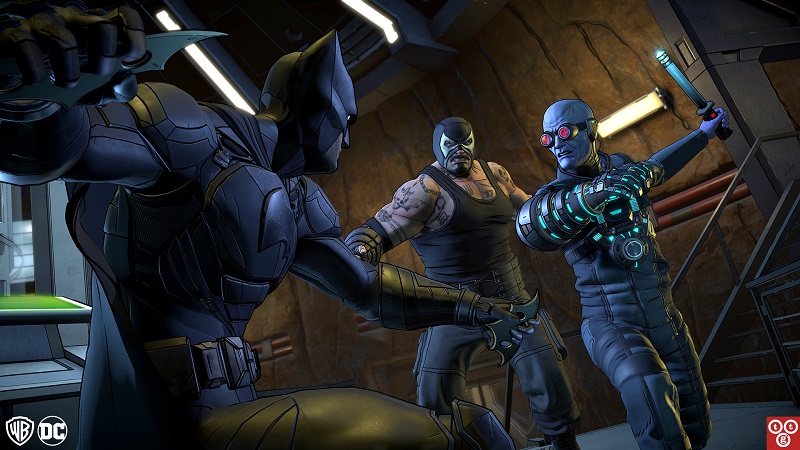
Batman’s fighting and detective abilities are showcased from the outset as all of Batman’s well known gadgets such as remotely piloted miniaturised drones, the grappling gun, batarangs, smoke grenades and electric bolt stunners, alongside the Batcomputer, Batmobile and multiple variations of the Batsuit and much more besides. Further evidence can be analysed within the Batcave via the Batcomputer, while the latest news reports can be read or watched and the codex containing biographies of allies, villains and locations can be viewed. Batman investigates the brutal acts and plans of The Riddler by combining multiple clues together to form a clearer view of what has happened and what he has planned for his enemies and Gotham City.
Character and enemy design is as flawless as the first season as Telltale fuses allies and enemies together or apart in a way that provides the player with the chance of pursuing answers as Batman in hostile interrogations of enemies or a more gentle approach as Bruce Wayne following a different lead that can evolve or crumble friendly relationships and alliances. Enemies begin with a ruthless take on The Riddler and his villains before expanding further from the second episode onwards.

Environment design is as magnificent as the previous season as Telltale’s storytelling continues to focus on the smaller and larger locations situated throughout the expansive Gotham City including Bat Cave, Wayne Enterprises, Arkham Asylum, The Riddler’s Hideout, Gotham City Police Department’s (GCPD) Headquarters, Gotham Underground’s train station, city streets and much more besides.
Extras include the ability to return to the Batcave in which a codex can be viewed as it could in the previous season; containing codex entries which are all gradually unlocked as you progress through the story. Codex is reminiscent to the Book of Fables from The Wolf Among Us as it provides a biography for the many characters and locations you will come across and explore in order to provide a significant wealth of information regarding their back story and how the characters and locations tie in with Batman and Bruce Wayne. Meanwhile, players are also given the choice of selecting a blue, red, yellow or purple bat tech colour which becomes the colour of Batman’s gadgets, gear and user interface from within the extras menu.
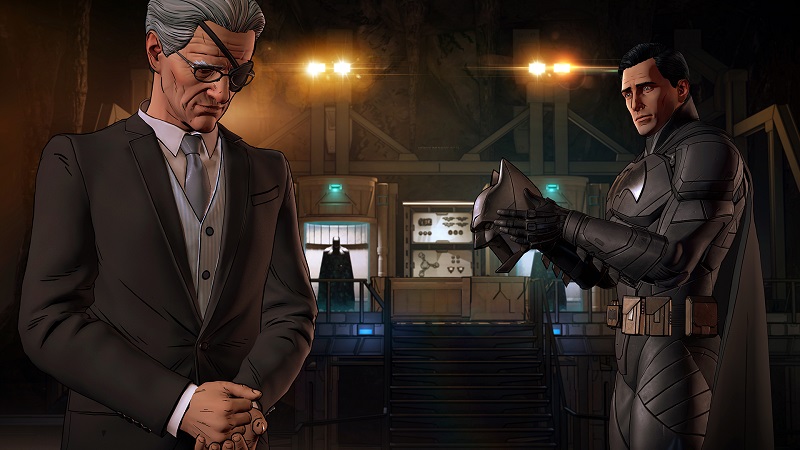
The My Choices feature from previous Telltale stories makes a welcome return, albeit under the alternative name of Relationships and Choices that provides an entire listing of your choices including the statistical analysis regarding the percentage of players who have made the same choice as you for each moral decision as well as a variety of decisions that are scattered throughout the chapters of each episode such as if Bruce Wayne visited Mori for information on The Riddler, if Bruce Wayne made a deal with Mori for his information on The Riddler, if Batman sacrificed the health of one agent held as a hostage to save other agent being held as hostages and much more besides with the feature being directly available from the extras menu after having completed an episode.
Telltale promised that more of their games would be headed to Vita at some point; until a Vita version of Batman: The Enemy Within – The Telltale Series Season 2 is potentially released digitally, remote play is a consolation. Batman: The Enemy Within’s remote play performance is on par with the graphics, audio and general performance of the PS4 version. Remote play control optimisation results in fighting actions being re-mapped from R2 to R when prompted and showing selectables has moved from L2 to L, alongside the rest of the controls remaining identical to the PS4 version; therefore producing a comfortable entertaining remote play experience.

The controls are appropriately mapped to the DualShock 4 controller by retaining the improvements from the previous Telltale seasons with the control scheme consisting of pressing X, triangle, square or O to start a conversation with a person in your group or to choose a response in a conversation with the buttons being clearly defined towards the bottom of the screen or alternatively adding moving the left analogue stick in a particular direction to perform combat actions; pressing R2 or L2 to perform further fight actions during combat; pressing L1 or L2 to show selectables within the nearby environment; pressing the d-pad buttons to navigate through Bruce Wayne’s or Batman’s inventory; changing the direction of the left analogue stick to move Bruce Wayne or Batman as you explore various locations within Gotham City and perform various evasive manoeuvres for Batman to avoid incoming enemy attacks; changing the direction of the right analogue stick to move the cursor around the surrounding environment for Batman to closely investigate and observe certain objects and items of importance as well as deciding who to start or continue a conversation with or even positioning your aim; pressing the share button takes you to the share feature menu; and pressing the options button to display the pause menu.
The PS4 version of previous Telltale stories have lacked any touch pad, light bar and vibration functionality with Batman: The Evil Within being no different in this aspect which is surprising as it would have provided some further improvements over previous Telltale stories. There is no touch pad implementation which could have had quick time events (QTEs) optionally mapped to the touch pad or it could have otherwise been utilised as an optional method of exploring your surrounding environments or even participating in conversations and moral choices, while the light bar could have produced white gradually fading to black to subtly reflect Bruce Wayne’s talkative with as little violence as possible approach in contrast to his alter ego Batman’s more aggressive tone as the time available to perform a QTE during a fight scene, alongside the lack of DualShock 4 vibration which could have been utilised when Batman is in combat with one of his many enemies.
Graphically, Batman: The Enemy Within possesses better lighting, shadows and character models to compliment the greater fluidity in performance during combat in a surprisingly positive improvement from Telltale in comparison to their high quality debut Batman adaptation, while retaining the stylised comic book strip art direction worthy of any Batman comic.
The presentation of the game is solid with a great user interface across various menus such as the main menu, episodes menu, extras menus, your choices menus, settings menus and gameplay menus with support for navigation via the left analogue stick, directional pad and face buttons, although it does not include support for navigation via the right analogue stick and there is a lack of a touch based user interface via the touch pad, despite how effective and responsive the touch screen user interface is in The Walking Dead on Vita. Menu backgrounds focus on the Batcave, the Batsuit and the Batmobile depending upon the chosen menu.

Batman: The Enemy Within is yet another Telltale season that possesses incredible voice-over performances throughout the entire cast that provokes emotional responses from the audience including returning cast members Troy Baker voicing Bruce Wayne, Batman and Thomas Wayne having previously voiced numerous major characters in Batman videogames and animations such as Harvey Dent, Two-Face, Arkham Knight, Jason Todd, Robin and The Joker, alongside performing the role of lead character Talion in Middle-Earth: Shadow of Mordor and Shadow of War, Sam Drake in Uncharted 4 and The Lost Legacy, Joel in The Last of Us, Jack Mitchell in Call of Duty: Advanced Warfare and Delsin Rowe in Infamous: Second Son. Laura Bailey voices Selina Kyle and Catwoman having previously voiced Nadine Ross in Uncharted 4 and Uncharted: The Lost Legacy, Chun-Li in Street Fighter IV and V, Eltariel and Ioreth in Middle-Earth: Shadow of War and Ioreth in Shadow of Mordor, Faye Lee in Binary Domain and Fetch in Infamous: Second Son and Infamous: First Light. Anthony Ingruber returns as the voice of The Joker, while Murphy Guyer voices James Gordon having previously voiced Aquila in Red Dead Redemption and Ammon Jerro in Neverwinter Nights 2, alongside Enn Reitel voices Alfred J. Pennyworth having previously voiced Delvin Mallory in The Elder Scrolls V: Skyrim and Ost Ordura in Kingdoms of Amalur: Reckoning and Dave Fennoy voices Lucius Fox having previously voiced the lead protagonist Lee Everett in The Walking Dead: The Complete First Season.
Meanwhile, new additions to the talented cast include Robin Atkin Downes voicing The Riddler having also voiced Luxord in Kingdom Hearts III, Nemesis Orcs, Humans and Herion in Middle-Earth: Shadow of War and Atoq Navarro, Tenzin, Talbot, Vincent Perez and Hector Alcazar in the Uncharted franchise. JB Blanc voices Bane having previously portrayed the character in Batman: Arkham Origins and Batman: Arkham Underworld and Boldo Holomek and Sid Pereira in Wolfenstein II: The New Colossus, while Matthew Mercer voices Dr. Freeze having starred in Batman: Arkham Knight as Robin and Tim Drake and Batman: Arkham Origins as Lonnie Machin and Anarky. Laura Post voices Harley Quinn having previously voiced Roxy in Street Fighter V and Ana Larive in Killing Floor 2, while Debra Wilson voices Amanda Waller having previously voiced Grace Walker in Wolfenstein II: The New Colossus, the Storyteller in InFamous 2: Festival of Blood and female pedestrians in InFamous 2, alongside Emily O’Brien voices Iman Avesta having also voiced Gamora in Guardians of the Galaxy: The Telltale Series.
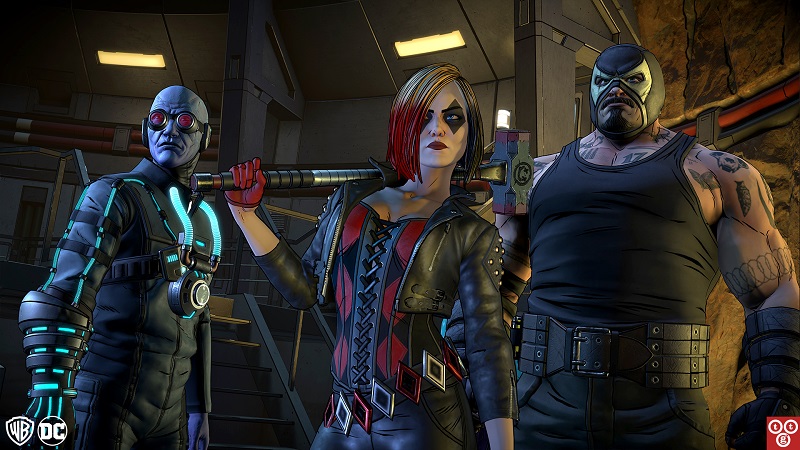
Sound effects include Batman or Bruce Wayne brawling with enemies during intense combat, alongside Batman investigating crime scenes and observing his surroundings by utilising his gadgets. Jared Emerson-Johnson’s classically composed music emphasises the same sort of drama and action seen in blockbuster Batman films. There is no DualShock 4 speaker implementation that could have produced sound effects related to Batman’s gadgets as well as Batman’s and Bruce Wayne’s fights.
The trophy list includes 31 trophies with 15 bronze trophies, 10 silver trophies, 5 gold trophies and 1 platinum trophy. The trophy list for all five episodes of Batman: The Enemy Within – The Telltale Series Season 2 is entirely based upon completing each chapter within each episode; resulting in a somewhat easy trophy list in regards to the fact that you will platinum the trophy list if you are able to complete the story with only a single playthrough required. It is estimated that depending upon skill and a good trophy guide to provide some helpful tips that it would take between 10 to 12 hours to platinum the trophy list.
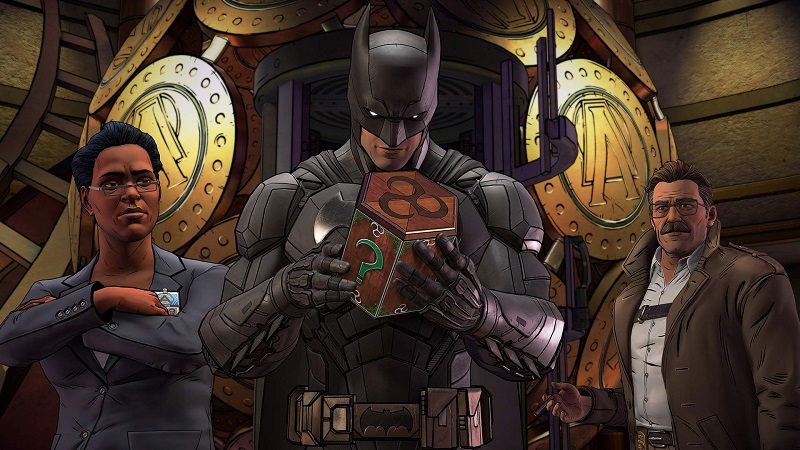
Batman: The Enemy Within’s difficulty curve is quite similar to that of the previous season as it certainly varies throughout each episode as there are some tough fights mostly for Batman and occasionally for Bruce Wayne against all manner of enemies, while there are easier story elements that require you to guide Bruce Wayne’s or Batman’s conversations and approach to a negative situation involving a variety of allies or enemies. The only settings that are customisable in relation to difficulty levels are for the in-game user interface as you can have a standard setting that allows you to have access to more feedback when you make important moral choices and help in regards to highlighting any areas of interest, while the minimal setting will completely turn off any hints, help and choice notifications. The user interface is as clear as it was in previous Telltale stories as the cursor is presented with a colourful and distinctive design as there are icons and colours within the cursor that really differentiate actions from one another rather than mostly being presented in the same way as actions were in earlier Telltale stories which makes for a better experience, while providing an appropriate amount of control inputs to represent your actions. As was the case with previous Telltale stories; you will find yourself being required to participate in many quick-time events during combat, although you will need to press the prompted buttons quickly within a rather limited period of time in order to ensure that you defeat an enemy of Batman or Bruce Wayne which is an appropriate design choice as it certainly adds an air of neither Bruce Wayne or his alter ego ever being invincible.

Batman: The Enemy Within – The Telltale Series Season 2 follows suit from its first season that actually introduced Crowd Play by also supporting Crowd Play that allows the player to host a Crowd Play gameplay session which essentially offers a local multiplayer experience that could technically support up to thousands of people within a large theatre or 4 to 12 people gathered in any given normal sized room for a party game atmosphere, although the host player needs to have a Telltale account. People can join your game quite simply as a game code is generated when the host player creates a Crowd Play environment; people can enter the game code on a particular Telltale web-address, then immediately start voting on choices throughout the story without any of the people even needing to own the game other than the host player. There is a wide range of accessibility to voting on choices as people can vote from pretty much any mobile device.
However, despite there being no online leaderboards; there is a statistical analysis of the decisions that you have made during each episode in comparison to the decisions that everyone else who has played Batman: The Enemy Within has made which is a positive design choice in the sense that it provides you with an in depth look at if you have made the correct decision or if you were incorrect in the eyes of a certain percentage of people who have played the game. Every decision within each episode is clearly defined in the statistical analysis and it is incredibly interesting to see at the end of the final chapter of every episode what percentage of players made the same decisions as you and to also see the percentage of players that disagreed with your choices.
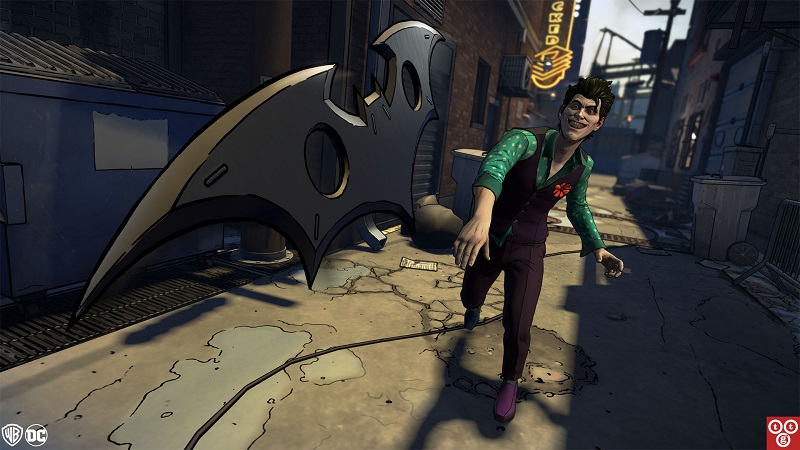
Batman: The Enemy Within’s replayability is as impressive as ever due to the ability for a group of people to vote on moral decisions via Crowd Play which perfectly compliments the multiple storylines that can be shaped by experiencing the season over the course of multiple playthroughs, while experimenting with different combinations of moral choices to see which direction your decisions will ultimately guide the story regarding which characters Bruce Wayne or Batman will protect more than others that were not previously saved and how characters evolve such as the possibility of The Joker becoming as much of a vigilante than a villain.
Analysis
- Title: Batman: The Enemy Within – The Telltale Series Season 2
- Developer: Telltale Games
- Publisher: Telltale Games
- System: PS4
- Format: Retail/PSN Download
- Cross-Buy: No
- Cross-Play: Yes (Save Import for Story Decisions from Season 1 to Season 2)
- Players: 1 (Crowd Play/Online Moral Choice Comparisons)
- Hard Drive Space Required: 22.73GB (Version 1.04)












